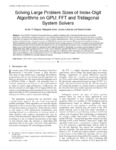Mostrar o rexistro simple do ítem
Solving Large Problem Sizes of Index-Digit Algorithms on GPU: FFT and Tridiagonal System Solvers
| dc.contributor.author | Pérez Diéguez, Adrián | |
| dc.contributor.author | Amor, Margarita | |
| dc.contributor.author | Lobeiras Blanco, Jacobo | |
| dc.contributor.author | Doallo, Ramón | |
| dc.date.accessioned | 2018-08-13T10:28:15Z | |
| dc.date.issued | 2018 | |
| dc.identifier.citation | A. P. Diéguez, M. Amor, J. Lobeiras and R. Doallo, "Solving Large Problem Sizes of Index-Digit Algorithms on GPU: FFT and Tridiagonal System Solvers," in IEEE Transactions on Computers, vol. 67, no. 1, pp. 86-101, 1 Jan. 2018. doi: 10.1109/TC.2017.2723879 | es_ES |
| dc.identifier.issn | 0018-9340 | |
| dc.identifier.issn | 1557-9956 | |
| dc.identifier.uri | http://hdl.handle.net/2183/20961 | |
| dc.description.abstract | [Abstract] Current Graphics Processing Units (GPUs) are capable of obtaining high computational performance in scientific applications. Nevertheless, programmers have to use suitable parallel algorithms for these architectures and usually have to consider optimization techniques in the implementation in order to achieve said performance. There are many efficient proposals for limited-size problems which fit directly in the shared memory of CUDA GPUs, however, there are few GPU proposals that tackle the design of efficient algorithms for large problem sizes that exceed shared memory storage capacity. In this work, we present a tuning strategy that addresses this problem for some parallel prefix algorithms that can be represented according to a set of common permutations of the digits of each of its element indices [1], denoted as Index-Digit (ID) algorithms. Specifically, our strategy has been applied to develop flexible Multi-Stage (MS) algorithms for the Fast Fourier Transform (FFT) algorithm (MS-ID-FFT) and a tridiagonal system solver (MS-ID-TS) on the GPU. The resulting implementation is compact and outperforms other well-known and commonly used state-of-the-art libraries, with an improvement of up to 1.47x with respect to NVIDIA's complex CUFFT, and up to 33.2x in comparison with NVIDIA's CUSPARSE for real data tridiagonal systems. | es_ES |
| dc.language.iso | eng | es_ES |
| dc.publisher | Institute of Electrical and Electronics Engineers | es_ES |
| dc.relation.uri | http://dx.doi.org/10.1109/TC.2017.2723879 | es_ES |
| dc.subject | Graphics processing units | es_ES |
| dc.subject | Instruction sets | es_ES |
| dc.subject | Kernel | es_ES |
| dc.subject | Signal processing algorithms | es_ES |
| dc.subject | Computer architecture | es_ES |
| dc.subject | Synchronization | es_ES |
| dc.subject | Proposals | es_ES |
| dc.title | Solving Large Problem Sizes of Index-Digit Algorithms on GPU: FFT and Tridiagonal System Solvers | es_ES |
| dc.type | info:eu-repo/semantics/article | es_ES |
| dc.rights.access | info:eu-repo/semantics/embargoedAccess | es_ES |
| dc.date.embargoEndDate | 2020-02-01 | es_ES |
| dc.date.embargoLift | 2020-02-01 | |
| UDC.journalTitle | IEEE Transactions on Computers | es_ES |
| UDC.volume | 67 | es_ES |
| UDC.issue | 1 | es_ES |
| UDC.startPage | 86 | es_ES |
| UDC.endPage | 101 | es_ES |
| dc.identifier.doi | 10.1109/TC.2017.2723879 |
Ficheiros no ítem
Este ítem aparece na(s) seguinte(s) colección(s)
-
GI-GAC - Artigos [180]






